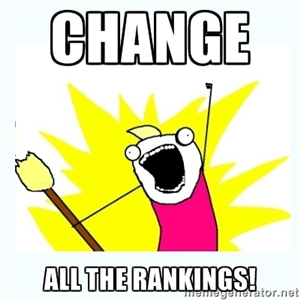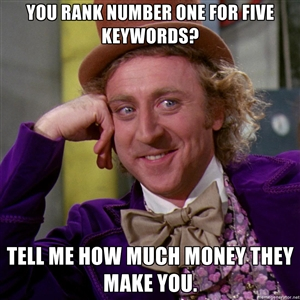I’m not going to say ‘keywords don’t matter anymore’. They do. Keywords are what people use to search the web and until people stop searching the internet in this way, they will still be relevant. But times have changed. It used to be relatively easy to target one or two high traffic and highly relevant terms, reach the number one spot, and stay there.
This isn’t the case now. Rankings will change. Almost every day. They may well be changing multiple times a day.
Pick five keywords you want to rank for, and rate your success based purely on where these keywords sit in Google, and you’re going to be disappointed. Google is just too temperamental for companies to be putting all their eggs in a few keywords. Focusing on the success of said keywords (however many) only offers you a snapshot of the true picture – a picture that shows your SEO to be failing.
People Don’t Search Like That
The fact is that short, generalised searches (i.e. the type of keywords companies choose to target) make up around 30% of searches performed. The remaining 70% of searches are ‘long tailed’ (search terms of three keywords or more).
Even if you rank number one for all of your chosen keywords, it doesn’t mean that all is lost if those keywords start dropping down the SERPs. A Moz Client case study, (old but still relevant) carried out over seven months, showed that not only were more than 250,000 unique phrases used to reach the client’s site in those seven months, but over 80% of these searches didn’t use any variation of the client’s primary keyword.
To be fair, if said primary keyword drops, and you lose 20% of your traffic, the initial hit may look pretty tragic, but the truth is that in most cases, these short and broad search terms are far less lucrative than their long-tailed friends.
Long Tail Searches = Better Quality Traffic
In most cases, more specific search terms drive better traffic. If you’re selling kitchen appliances for example, and someone lands on your site for the term ‘kitchen appliances’ there’s a high chance you won’t have what they’re looking for, and they won’t buy.
In fact, such a broad search term signals that they don’t even know what they’re looking for, and therefore aren’t in a position to buy just yet.
On the other hand, if someone lands on your site via the search term ‘BELLING BI60F Electric Oven’ and they land on a product page for this item, there is a very high chance they will buy. They know exactly what they’re looking for and you’ve given it to them.
What We Should Be Looking At
In short: unbranded organic traffic, and revenue. Unbranded organic traffic is the traffic you get to your site via searches that don’t include any brand related terms. If this is growing month-on-month, you’re succeeding – regardless of where your core keywords sit in the SERPS.
If the revenue from this traffic is increasing too, then even better – your SEO is doing exactly what it should be.
Unfortunately, the link between SEO and trying to rank for specific keywords is so ingrained that many companies (and even some SEOs) can’t seem to get past the idea that success in this industry means a top 10 placing for x keywords. It doesn’t.
If you’re ranking in position one of Google for five keywords while spending £1000 a month with an agency to get, and keep, those positions, yet those five keywords are driving £700 of business a month – how is that a success?
Yet if you’re spending £1000 a month on SEO, visitors are finding you via around 500 different unbranded search terms a month, and together those search terms are driving £6000 of business – there’s no arguing that isn’t a success.
The SEO industry needs to stop placing so much importance on so-called lucrative keywords. If your unbranded organic traffic is increasing, and this traffic is making you more money than you’re spending to get it, then your SEO is working.







